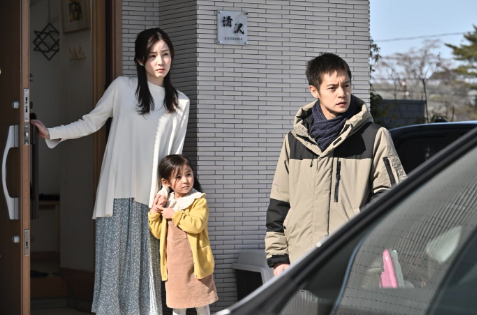[Film Review] New York Asian Film Festival: Home Sweet Home (2023)

Star of last year’s NYAFF hit Shin Ultraman, actor and filmmaker Takumi Saitoh returned to the fest this year with his second directorial feature Home Sweet Home – a slick and sinister thriller that subverts the image of the haunted house from dusty old mansion to something far more enviable.
Home Sweet Home follows the unraveling of young couple Kenji and Hitomi Kiyosawa (Masataka Kubota and Misako Renbutsu respectively), new residents in a state-of-the-art smart home. With revolutionary temperature control technology, high-definition security cameras and functional architectural design, the house seems like the perfect place to raise their young daughter and newborn baby. However, when a series of eerie events begin to affect his family both in and outside of the home, Kenji is forced to reckon with the idea that they might not be the only things dwelling there.
Using the Rinko Kamizu’s 2019 novel Sweet My Home as a jumping off point, Saitoh has crafted an ominously restrained slow burn feature that keeps the audience on their toes right until its bleak and brutal end. By keeping the true nature of the disturbances in the dark, Saitoh gives space for the familial drama to unfold, slowly peeling back layers of tension as we’re helpless to wonder if this family are haunted by something supernatural, their own neurosis, or something much more realistically sinister.
LISTEN TO OUR HORROR PODCAST!
![[Ghouls Podcast] Maniac (2012) with Zoë Rose Smith and Iona Smith](https://images.squarespace-cdn.com/content/v1/5fe76a518d20536a3fbd7246/1696356006789-NYTG9N3IXCW9ZTIJPLX2/maniac.jpg)
The everyday terror of Home Sweet Home is grounded by Kubota’s morally complex character-driven performance as Kenji, a flawed husband who we nonetheless end up rooting for due to his emotionally charged performance that teases a trauma just bubbling under the surface. Other standout performances include Nao Honda (who also had a starring turn in NYAFF’s other standout Japanese thriller, #MANHOLE) as ambitious architect Ms Honda, Yosuke Kubozuka as Kenji’s troubled brother Satoru, and Toshie Negishi, who, with roles in Audition, Shikoku and Kidan Piece of Darkness, has always been a key player in the Japanese genre scene.
Thematically, crime, drama and horror all converge at various points throughout Home Sweet Home in ways reminiscent of the works of Kiyoshi Kurosawa. Frequent Kurosawa collaborator and cinematographer Akiko Ashizawa leant her DP talents to Home Sweet Home, and fans of Kurosawa’s visual style will be pleased to see stylistic influences within framing and a certain mundane, urban malevolence.

Alongside the banality of evil, a distrust of technology has always been a prominent theme of modern-day Japanese horror. With Japan’s swift advances in technology, an existential anxiety has often followed, leading to classics such as Ring and Pulse. While never embracing the theme as explicitly, through various set pieces Home Sweet Home certainly engages the idea that a technically utopian home means nothing if the occupants within aren’t safe. In the age of social media, these technological advances work as ways to prove our worth in a world so obsessed with presenting the perfect image. While the film delves into traditional thriller tropes (including a particularly vicious, taboo-breaking ending that will leave many viewers gasping), perhaps the true horror of Home Sweet Home comes from societal obsession with idealism, the perfect body, the perfect family, the perfect home, and even the perfect death.


![[Ghouls Podcast] Ghouls Watch: Bucket List of the Dead, Blood Drive, Candy Land & more](https://images.squarespace-cdn.com/content/v1/5fe76a518d20536a3fbd7246/1696261000263-58VQFOVWPE363OFGP7RF/GHOULS+WATCH.jpg)
![[Ghouls Podcast] Tender Is The Flesh with Zoë Rose Smith, Bel Morrigan and Liz Bishop](https://images.squarespace-cdn.com/content/v1/5fe76a518d20536a3fbd7246/1693769261264-MS4TS4Z4QC1N15IXB4FU/Copy+of+%5BJuly%5D+Antiviral%2C+possesoor+and+infinity+pool.jpg)
![[Ghouls Podcast] Antiviral, Possessor & Infinity Pool with Zoë Rose Smith, Amber T and Iona Smith](https://images.squarespace-cdn.com/content/v1/5fe76a518d20536a3fbd7246/1691238787263-XYRKXW2Z7RWI9AY2V2GX/%5BJuly%5D+Antiviral%2C+possesoor+and+infinity+pool+%281%29.jpg)
![[Ghouls Podcast] Ghouls Watch: Body Horror Recommendations](https://images.squarespace-cdn.com/content/v1/5fe76a518d20536a3fbd7246/1691238687847-L9U434I1U4HZ3QMUI3ZP/%5BJuly%5D+Ghouls+Watch+-+Website+%281%29.jpg)
![[Ghouls Podcast] The Last House on the Left (2009) with Zoë Rose Smith and Jerry Sampson](https://images.squarespace-cdn.com/content/v1/5fe76a518d20536a3fbd7246/1687863043713-54DU6B9RC44T2JTAHCBZ/last+house+on+the+left.jpg)
![[Ghouls Podcast] Ghouls Watch: Bones and All, Suitable Flesh, The Human Centipede & more](https://images.squarespace-cdn.com/content/v1/5fe76a518d20536a3fbd7246/1687855203348-7R2KUSNR6TORG2DKR0JF/%5BJune%5D+Ghouls+Watch+-+Website.jpg)
![[Ghouls Podcast] 3 Original vs. Remake Horror Films with Rebecca McCallum & Kim Morrison](https://images.squarespace-cdn.com/content/v1/5fe76a518d20536a3fbd7246/1685286663069-0Q5RTYJRNWJ3XKS8HXLR/%5BJune%5D+Original+vs.+Remake+Horror+Films.png)
![[Ghouls Podcast] Ghouls Watch: The Devil’s Candy, Morgana, Dead Ringers & more](https://images.squarespace-cdn.com/content/v1/5fe76a518d20536a3fbd7246/1685284429090-5XOOBIOI8S4K6LP5U4EM/%5BMay%5D+Ghouls+Watch+-+Website.png)
![[Ghouls Podcast] The Bay (2012) with Ariel Powers-Schaub & Amber T](https://images.squarespace-cdn.com/content/v1/5fe76a518d20536a3fbd7246/1684751617262-6K18IE7AO805SFPV0MFZ/The+Bay+website+image.jpg)
![[Ghouls Podcast] The Ruins (2008) with Ash Millman & Zoë Rose Smith](https://images.squarespace-cdn.com/content/v1/5fe76a518d20536a3fbd7246/1684076097566-BE25ZBBECZ7Q2P7R4JT4/The+Ruins.jpg)
![[Ghouls Podcast] Picnic at Hanging Rock (1975) with Zoë Rose Smith & Rebecca McCallum](https://images.squarespace-cdn.com/content/v1/5fe76a518d20536a3fbd7246/1682536446302-I2Y5IP19GUBXGWY0T85V/picnic+at+hanging+rock.jpg)
![[Ghouls Podcast] Ghouls Watch: Deathproof, Child’s Play, Ghostwatch & more](https://images.squarespace-cdn.com/content/v1/5fe76a518d20536a3fbd7246/1682447065521-DWF4ZNYTSU4NUVL85ZR0/ghouls+watch.png)
![[Ghouls Podcast] 5 Coming-of-Age Horror Film Recommendations](https://images.squarespace-cdn.com/content/v1/5fe76a518d20536a3fbd7246/1681418402835-EMZ93U7CR3BE2AQ1DVH4/S2+EP5.png)
![[Ghouls Podcast] Psychotic Women in Horror with Zoë Rose Smith & Mary Wild](https://images.squarespace-cdn.com/content/v1/5fe76a518d20536a3fbd7246/1678635495097-X9TXM86VQDWCQXCP9E2L/Copy+of+Copy+of+Copy+of+GHOULS+PODCAST+THE+LOVED+ONES.jpg)
![[Ghouls Podcast] Good For Her Horror Film Recommendations](https://images.squarespace-cdn.com/content/v1/5fe76a518d20536a3fbd7246/1678634497037-W441LL37NW0092IYI57D/Copy+of+Copy+of+GHOULS+PODCAST+THE+LOVED+ONES.jpg)
![[Ghouls Podcast] Ghouls Watch: Severance, Run Sweetheart Run, Splice & more](https://images.squarespace-cdn.com/content/v1/5fe76a518d20536a3fbd7246/1677589685406-YZ9GERUDIE9VZ96FOF10/Copy+of+GHOULS+PODCAST+THE+LOVED+ONES+%281%29.jpg)
![[Ghouls Podcast] Nekromantik with Zoë Rose Smith & Rebecca McCallum](https://images.squarespace-cdn.com/content/v1/5fe76a518d20536a3fbd7246/1677422649033-Z4HHPKPLUPIDO38MQELK/feb+member+podcast.jpg)
![[Ghouls Podcast] The Loved Ones (2009) with Liz Bishop](https://images.squarespace-cdn.com/content/v1/5fe76a518d20536a3fbd7246/1676369735666-56HEK7SVX9L2OTMT3H3E/GHOULS+PODCAST+THE+LOVED+ONES.jpg)
![[Ghouls Podcast] Terrifier (2016) & Terrifier 2 (2022) with Janine Pipe](https://images.squarespace-cdn.com/content/v1/5fe76a518d20536a3fbd7246/1674478017541-0DHH2T9H3MVCAMRBW1O1/_PODCAST+NO+IMAGE+2023+EP+4+%282%29.jpg)
![[Ghouls Podcast] Final Destination 5 & Wrap-up with Ariel Powers-Schaub & Iona Smith](https://images.squarespace-cdn.com/content/v1/5fe76a518d20536a3fbd7246/1672841326335-WER2JXX7WP6PO8JM9WB2/PODCAST+BONUS+2023+%284%29.jpg)
![[Ghouls Podcast] Final Destination 3 & 4 with Ariel Powers-Schaub & Iona Smith](https://images.squarespace-cdn.com/content/v1/5fe76a518d20536a3fbd7246/1672841151148-U152EBCTCOP4MP9VNE70/PODCAST+BONUS+2023+%283%29.jpg)
![[Ghouls Podcast] Krampus (2015) with Megan Kenny & Rebecca McCallum](https://images.squarespace-cdn.com/content/v1/5fe76a518d20536a3fbd7246/1672839790368-VYX6LIWC5NVVO8B4CINW/_PODCAST+NO+IMAGE+2023+EP+17.jpg)
![[Ghouls Podcast] Soho Horror Film Review with Hannah Ogilvie & Caitlyn Downs](https://images.squarespace-cdn.com/content/v1/5fe76a518d20536a3fbd7246/1672840392291-XQGQ94ZN9PTC4PK9DTN1/_PODCAST+NO+IMAGE+2023+EP+16.jpg)
![[Ghouls Podcast] Final Destination 1 & 2 with Ariel Powers-Schaub & Iona Smith](https://images.squarespace-cdn.com/content/v1/5fe76a518d20536a3fbd7246/1672841181605-5JOOW88EDHGQUXSRHVEF/PODCAST+BONUS+2023+%282%29.jpg)
![[Ghouls Podcast] The Borderlands (2013) with Jen Handorf](https://images.squarespace-cdn.com/content/v1/5fe76a518d20536a3fbd7246/1672839985316-KPLOVA9NGQDAS8Z6EIM9/_PODCAST+NO+IMAGE+2023+EP+15.jpg)
![[Film Review] Return to Silent Hill (2026)](https://images.squarespace-cdn.com/content/v1/5fe76a518d20536a3fbd7246/1769672582439-C8RQWP3CYUW1JX4ZRNLE/RETURN+TO+SILENT+HILL.jpg)
![[Film Review] Flights of Reverie (2025)](https://images.squarespace-cdn.com/content/v1/5fe76a518d20536a3fbd7246/1769111579457-CTUW03G3J34P6SFRWWEM/flights-of-reverie-filmstill-ornithologist-berlin-li-wallis06.jpg)
![[Film Review] Confessions in Static (2025)](https://images.squarespace-cdn.com/content/v1/5fe76a518d20536a3fbd7246/1768397467245-3KOF3LUBRDQVJ8QVDONA/Confessions_Key_Alternate_1920x1080.png)
![[Film Review] Stalker (2025)](https://images.squarespace-cdn.com/content/v1/5fe76a518d20536a3fbd7246/1768232505839-TS9K7YBLOXNQML8PUWTP/Screenshot+2026-01-12+at+15.17.49.png)
![[Film Review] Bone Lake (2025)](https://images.squarespace-cdn.com/content/v1/5fe76a518d20536a3fbd7246/1768151214859-U1AUN7JALKRK4W5NGJVH/Andra+Nechita+and+Maddie+Hasson+in+Bone+Lake+%28Signature+Entertainment%29+1.jpg)
![[Film Review] 28 Years Later: The Bone Temple (2026)](https://images.squarespace-cdn.com/content/v1/5fe76a518d20536a3fbd7246/1768152692285-7TK6SN62JY4H3TJDYABP/The+Bone+temple.jpg)













